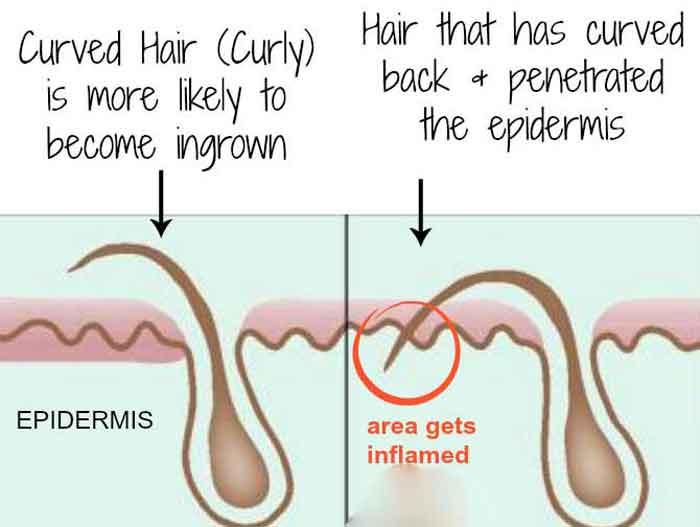Ingrown hair or herpes? How can you the difference between these two conditions that occur on your skin? Most individual tend to confuse the two. Here how they differ in terms of causes, appearance/pictures and treatment options.
Ingrown vs Herpes-Is it an Ingrown Hair or Herpes? Differences
What is ingrown Hair?
Hairs that curl and grow back into the skin instead of growing outwards from the skin are called ingrown hairs. In most times, hair grows back into the skin when your hair follicles are clogged. [1]
What is Herpes?
Herpes refers to a group of viruses that causes painful sores and blisters. Herpes viruses affect the skin and sometimes; the nervous system.
Differences
From time to time, you may confuse signs of herpes and symptoms of ingrown hairs especially when the ingrown hairs are infected. Below are identified differences based on various concepts;
Formation and appearance
Ingrown hairs form when hairs grow back to the skin. You can notice the presence of ingrown hairs since they appear on the skin as a raised bump looking like a small pimple. In men, ingrown hairs will pop up in form of bumps around the chin, neck or cheeks especially after shaving.
If you are a female, you will mostly notice bumps on the legs after shaving. This bumps also pop up around the armpits and pubic areas. In conclusion, whether male or female, bumps around hairy part of your body is a sign that you could be having ingrown hairs.
Pimples that come as a result of ingrown hairs are covered by dead skin making them different from herpes. Using a magnifying mirror, you will observe that the bump has a dark shadow inside. This is the hair. In the case of herpes, no dark shadow will be observed.
On the other side, Herpes appears as blisters and sores. Herpes forms on the skin as mentioned above. You can therefore tell the difference between ingrown hairs and herpes by the way they appear. While ingrown hairs will appear as a bump, herpes appear as sores. The blisters characterizing herpes have a dimple in the middle.
American Family Physician explains that herpes are at most 2 millimeters large. Blisters caused by herpes are cloudy, yellow and clear. [2]
Symptoms
Mayo clinic singles out the signs and symptoms of Ingrown hairs.[3] The symptoms include; itching, small bumps, pus-filled blisters, pain, and embedded hairs. You could also realize that your skin starts to darken when ingrown hairs form.
Herpes on the other hand is accompanied by symptoms such as sores, or red blisters; around or on the affected area. This could be in the genitals, mouth and concluding part of the large intestine. [4] Other symptoms are such as; itching and pain when urinating, discharge, ulceration on the cervix, fever, feeling unwell and cold sores.
Causes
Ingrown hairs come as a result of several things. Listed below are some of the causes you need to familiarize with:
- Having clogged skin pores on hair growing areas. Your hairs find it hard to grow way above the skin when the pores are clogged. The hairs instead grow inwards resulting to ingrown hairs.
- Improper shaving techniques. You are advised to always shave in the direction of hair growth. If you go against this rule, you are likely to aid in curling the hair inwards leading to ingrown hairs.
- Having curly hair. If your hair is curly you are more likely to develop ingrown hair problems as compared to people with normal hair. Naturally curly hair easily finds its way back into the skin and hence you get ingrown hair problems. [5]
Weill Cornel Medical College explains that, people with curly hair are more vulnerable to ingrown hairs.[6]
On the contrary, Herpes is known to be caused by herpes simplex virus (HSV). When the virus is on the skin of one person, it can be passed on to another person. This is majorly through the moist skin around the mouth, reproductive organs or even the excretory opening. The eyes are also at a risk of such spread.
However, touching surfaces that have been touched by an infected person may not cause the spread of the virus. Activities such as sharing a towel cannot also lead to spreading of the virus from an infected person.
Causes of the type of herpes classified as genital herpes. [7]
Oral herpes, which is herpes infection around the mouth is caused by touching open sores, and getting into contact with infected saliva such as through kissing an infected person.[8]
Treatment options
Ingrown hairs do not necessitate treatment, however, in the case where the ingrown hair becomes infected, you may opt to seek treatment. Before going to see your doctor, you should try the available ingrown hair products and home remedies as they are cheap and have fewer side effects. Suggested home remedies include;
Baking soda paste
This paste is used to exfoliate your skin especially on the affected area. Through skin exfoliation, the ingrown hair is able to find its way out by popping up. It also eases the inflammation on the affected area. In place of baking soda, you could use olive oil or sugar to scrub the skin on the affected area.
Pulling the ingrown hair out
Sometimes, all you need to do is pull out the ingrown hair from the skin as long as you can reach it. After all, the bump appears on your skin because the ingrown hair is still inside. Carefully dig into your skin and squeeze to get hold of the hair then pluck it out.
Tea tree oil
If the ingrown hair exists and causes no discomfort, you may have no reason bothering to get rid of it. However, you seek to get rid of it due to the pain, itchiness and inflammation that it causes.
Tea tree oil relieves you of such discomfort. This is because of its antiseptic properties. It is always advisable that you dilute the oil with another essential oil such as olive oil to prevent possible stinging or irritation. [9]
Where the home remedies don’t work, there are other treatment options you could get from your hospital as follows;
- Retin A (Retinoids) which removes dead skin around the area where the ingrown hair is allowing for popping out of the hair from the skin.
- Medicine which is rubbed on the skin aids to reduce irritation and swelling.
- Antibiotics are either rubbed onto the skin or taken orally so as to treat the ingrown hair infection[10]
As much as ingrown hairs and herpes have some similar symptoms, their treatment options differ. You must however keep in mind that there is no identified cure for the virus causing herpes.
Like ingrown hairs, herpes can also be treated using home remedies such as lemon balm, baking soda, tea tree oil, and aloe Vera gel. However, these remedies take long to treat herpes and you may be forced to opt for therapies. There are several therapy options to treat herpes such as the following;
Antiviral medications especially in case of genital herpes. These medications include valacyclovir, acyclovir, and famciclovir. Antiviral medication is majorly used for patients who are in their first episode of genital herpes.
This is done following two therapies;
Episodic therapy
This therapy involves intake of the antiviral medications immediately after the first outbreak of herpes symptoms. It is usually aimed at preventing spread to other areas as well as recurrence. On average, episodic therapy reduces the outbreak period by a day or two.
Suppressive therapy
This therapy is meant to eliminate the outbreak of herpes simplex virus. You are advised to take antiviral medication daily so as to eliminate the symptoms and their frequency of occurrence. Research shows that 75% of the outbreaks are reduced by use of these antiviral medicines. [11]
How long they take to heal
Ingrown hairs can be a serious pain. They can last between a few days to several weeks. Ingrown hairs last as long as the hair does not grow naturally. When you use the treatment options suggested above, the ingrown hair goes away in a few days. Even that, be careful which treatment option you go for since some methods like plucking the ingrown hair extends the healing period. [12]
Looking at herpes, if you do not seek medication, herpes outbreak takes very long to disappear. When untreated, herpes will take up to 6 weeks. Antiviral medication reduces the outbreak period as well as possibility of future occurrences.
When you take the antiviral medications properly, the outbreak will take less than a week. Statistics show that herpes outbreak reduces by about 70% to 80% per year[13] with use of antivirals.
While herpes are recurring, that is, goes away after treatment and then comes back, ingrown hairs once treated go away for good in most if not all cases.
Ingrown vs Herpes-Similarities
Despite the many differences, you can identify the similarities between herpes and ingrown hairs. The similarities are the reason these two are occasionally confused.
Looking at the symptoms, they have several things in common. Both of them have pain and itching. They are both irritating and causes discomfort. Additionally, the two can be treated using similar home remedies such as baking soda, and tea tree oil.
Moreover, the bumps as a result of herpes and ingrown hairs disappear on their own after sometime. This means, they both can heal without subjection to any form of treatment.
Sources & References
[1] http://www.webmd.com/skin-problems-and-treatments/guide/ingrown-hair-causes-symptoms-treatment#1
[2] https://safesymptoms.com/ingrown-hair-vs-herpes/
[3] http://www.mayoclinic.org/diseases-conditions/ingrown-hair/basics/symptoms/con-20034717
[4] http://www.webmd.com/genital-herpes/pain-management-herpes#1
[5] http://www.huffingtonpost.com/2015/05/15/ingrown-hairs-causes-treatment_n_7276082.html
[6] http://www.newhealthguide.org/Herpes-Or-Ingrown-Hair.html
[7] http://www.medicalnewstoday.com/articles/151739.php
[8] http://articles.mercola.com/herpes/causes.aspx
[9] http://everydayroots.com/how-to-get-rid-of-ingrown-hairs
[10] http://www.webmd.com/skin-problems-and-treatments/guide/ingrown-hair-causes-symptoms-treatment#1
[11] http://www.ashasexualhealth.org/stdsstis/herpes/herpes-treatment/
[12] https://www.leaf.tv/articles/how-long-does-it-take-for-ingrown-hairs-to-go-away/
[13] http://www.hsvoutbreak.com/how-long-do-herpes-outbreaks-last



